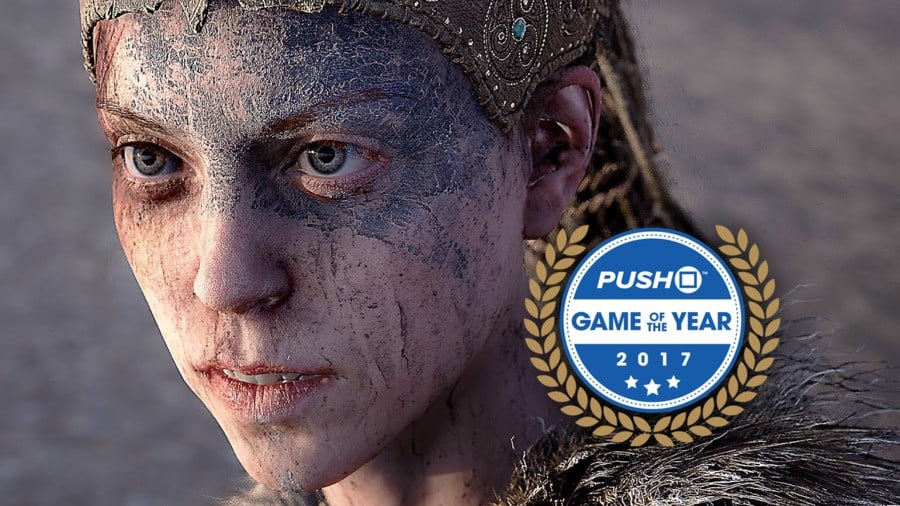
Hellblade: Senua’s Sacrifice is dark, poignant, and utterly essential. It’s the only game in our 2017 countdown capable of having long-lasting effects on real lives, and for that alone it deserves its position in our list. But the Celtic adventure is so much more than an exploration into the symptoms of psychosis – it’s also an audio-visual tour-de-force fashioned on an indie budget, and it comes hand-in-hand with some innovative gameplay ideas to boot.
Front and centre of these is the unorthodox save system, which threatens the deletion of your progress if you die too many times. It’s a warning designed to keep you on the edge of your seat; a niggling worry intended to replicate just a sliver of what’s going on inside Senua’s head. Is the mechanic real or is it all just a ruse? Without sneaking a glimpse at the source code it’s impossible to know – and that’s exactly the point.
It’s impressive just how much empathy this game is able to elicit through traditional gameplay. One sequence sees you navigating a pitch-black environment, relying on sound to get through unscathed. Other areas explore perception, as the environments twist and transform depending on what you’re looking at. Every single moment of the four hour campaign seems deliberately designed, with the development informed by mental health patients and physicians.
Which brings us, of course, to the performance of Melina Jeurgens as the troubled titular lead. Ground-breaking motion capture technology paired with a tireless commitment to the character makes for harrowing viewing at times, but it’s truly superlative stuff. Anything less than an out-of-this-world performance could have cooled the game’s good intentions, but Jeurgens is spectacular, conveying the demons of her character with frightening realism.
And then there are “the voices”. A persistent presence from the beginning of the game to its very end, developer Ninja Theory uses binaural microphones to capture the presence of “others” all around you. These not only make for a stressful and, frankly, terrifying soundscape, but they’re also weaved into the gameplay, sometimes warning you of imminent danger – and other times tricking you into taking a wrong step.
All of this combines to create a deeply affecting game that truly helps communicate the nuances of a mostly misunderstood disease. And just to cap it all off, Cambridge-based developer Ninja Theory did it all without the backing of a major publisher, self-funding and self-publishing in order to retain full creative control. The game may lack the scale of some of 2017’s biggest hitters, and it’s certainly not the most “fun” to play – but it’s an important release. And that’s enough for us.
Were you affected by Hellblade’s poignant tale? Did you struggle with the subject matter of Senua’s Sacrifice, or did you find its interactive story-telling eye-opening? Mourn Dillion in the comments section below.





Comments 16
I haven't played it yet but it's on my list
Need to play this and Nioh. Two quality games I missed out on in 2017!
I realise I haven't played all the 2017 games I should, but of the ones I managed, this one really stood out. A great piece work from Ninja Theory.
This will be on my to-buy list at some point next year. Saving up to get me a Sony Platinum headset so I can experience that 3D positional audio.
Still need to get some proper 3d headphones before playing it. If memory serves, Sammy mentioned that it makes a great difference when you play it with 3d sound.
Still planning on buying this game.
I have this in my backlog, and can’t wait to play it.
I read or heard somewhere that Juergens isn’t even an actress, at least not before this game. I think they said she was just someone who works for Ninja Theory and was cast in the role, but she’s never acted before. Amazing if true.
Tekken 7, Night in the Woods, Yakuza Zero and now Hellblade.
I still didn't play any of these games, I feel like garbage now.
@PS_Nation well at least you have alot to look forward to!
I'm still in shock that Edge only gave this 4/10.
@ellsworth004 True, but let's see if i played at least one game from the top 10.
2017 was a fantastic year for the PS4, what with Persona 5, HZD, Nioh and Nier (among others). However Hellblade: Senua's Sacrifice was the game that stuck with me for days after completing it, despite some minor quibbles. My game of the year.
@Neolit jajaja. it's really awesome with headphones ^-^
@Neolit that's a fairly accurate summation
Bought it on Black Friday along with Resident Evil 7 and Uncharted Lost Legacy, just started playing it.
It's pretty good so far, the puzzles could be a bit better though.
Loved Hellblade, one of those games I really wish I could play for the first time all over again.
Show Comments
Leave A Comment
Hold on there, you need to login to post a comment...